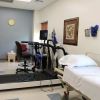1. What is Heart Disease?
Heart disease is a general term used to describe a range of conditions that affect the heart. These conditions can involve the heart’s blood vessels, muscles, or rhythm. The most common types of heart disease include coronary artery disease, heart attacks, heart failure, and arrhythmias. Understanding how heart disease affects the body is crucial for prevention and management. This article will break down the key impacts of heart disease and provide useful insights for improving your heart health.

2. How Heart Disease Affects the Body
Heart disease can have a profound effect on various organs and systems within the body. The most immediate impact is on the cardiovascular system, as the heart struggles to pump blood efficiently. However, the effects go beyond just the heart. Here’s a closer look at the different ways heart disease affects the body:
- Reduced Oxygen Supply: When the heart is weakened, it has a harder time pumping oxygen-rich blood to other organs, leading to fatigue and difficulty performing everyday activities.
- Increased Risk of Stroke: Heart disease can cause blood clots that may travel to the brain, leading to a stroke.
- Kidney Damage: Poor circulation caused by heart disease can also affect kidney function, leading to chronic kidney disease.
- Peripheral Artery Disease: A reduced blood flow due to clogged arteries can also affect the limbs, causing pain and numbness in the legs.
3. Common Symptoms of Heart Disease
The symptoms of heart disease can vary widely depending on the type of condition, but there are some common signs that many individuals experience. Recognizing these symptoms early can help prevent further complications:
- Chest Pain or Discomfort: Often a primary indicator of coronary artery disease or a heart attack, chest pain may feel like pressure or tightness.
- Shortness of Breath: This occurs when the heart can no longer pump blood effectively, causing fluid to back up in the lungs.
- Fatigue: Chronic tiredness may be a sign of heart failure, especially when combined with other symptoms.
- Swelling in the Legs: Fluid retention can result in swelling, particularly in the lower extremities, when the heart is not functioning properly.
4. Long-Term Effects of Heart Disease
If heart disease is left untreated, it can lead to serious long-term health complications. These may include:
- Heart Failure: Over time, the heart may become too weak to pump blood efficiently, leading to heart failure.
- Arrhythmias: Heart disease increases the risk of developing abnormal heart rhythms, which can cause serious health risks, including sudden cardiac arrest.
- Chronic Fatigue: People with long-term heart disease often struggle with constant fatigue due to reduced oxygen delivery throughout the body.
- Impaired Organ Function: The lack of adequate blood flow can damage organs like the kidneys, liver, and brain, resulting in permanent organ dysfunction.
5. Preventing Heart Disease: Tips for a Healthy Heart
While heart disease is a serious health concern, the good news is that many types of heart disease can be prevented or managed effectively with a few lifestyle changes. Here are some tips to reduce your risk:
- Maintain a Healthy Diet: Eating a balanced diet rich in fruits, vegetables, whole grains, and lean proteins can help keep your heart healthy.
- Exercise Regularly: Physical activity strengthens the heart and helps maintain healthy cholesterol levels.
- Avoid Smoking: Smoking damages the heart and blood vessels, significantly increasing the risk of heart disease.
- Control Your Blood Pressure: Keeping your blood pressure in check can help reduce the strain on your heart.
- Manage Stress: Chronic stress can contribute to heart disease, so it's important to incorporate stress-reducing activities like meditation or yoga.
6. Real-Life Case Study: Impact of Heart Disease
Let’s look at a real-life case study of John, a 55-year-old man who experienced a heart attack due to undiagnosed coronary artery disease. Despite feeling some mild chest discomfort for months, he ignored the symptoms. After his heart attack, he learned that a healthier lifestyle and early detection could have significantly reduced his risk. John’s story highlights the importance of understanding heart disease symptoms and taking action early to prevent major health crises.
Atlanta Heart Specialists
atlanta heart specialists
4375 Johns Creek Pkwy #350, Suwanee, GA 30024, USA

7. Consulting Health Professionals for Heart Disease
If you or a loved one is experiencing symptoms of heart disease or simply want to assess your risk, consulting a healthcare professional is essential. Doctors can perform tests like ECGs, echocardiograms, and stress tests to evaluate heart health. Early intervention can make a significant difference in managing heart disease and improving quality of life.
Heart disease is a serious condition that affects millions of people worldwide. By understanding its effects on the body and taking proactive steps to improve heart health, you can reduce your risk and live a longer, healthier life.
If you're looking for heart health advice or need support in managing heart disease, visit Free Range Health Professionals for expert guidance and personalized care.





















Deborah Heart and Lung Center
deborah heart and lung center
200 Trenton Rd, Browns Mills, NJ 08015, USA